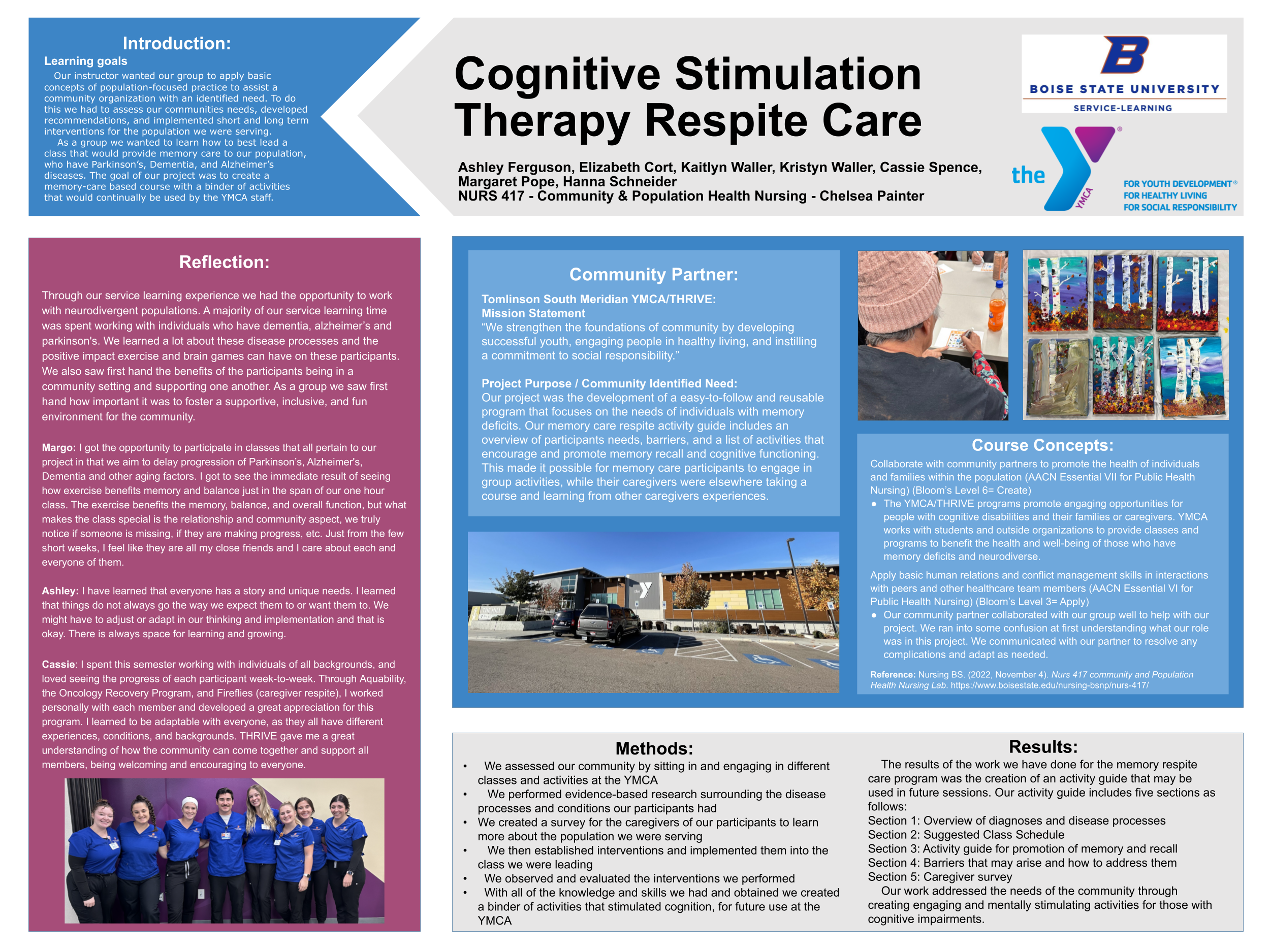Elizabeth Cort, Ashley Ferguson, Margaret Pope, Hanna Schneider, Cassie Spence, Loren Torok, Kaitlyn Waller, Kristyn Waller
Chelsea Painter MSN, APRN, FNP-C – NURS 417
Tomlinson South Meridian YMCA

Introduction
Learning Goals:
Our instructor wanted our group to apply basic concepts of population-focused practice to assist a community organization with an identified need. To do this we had to assess our communities needs, developed recommendations, and implemented short and long term interventions for the population we were serving.
As a group we wanted to learn how to best lead a class that would provide memory care to our population, who have Parkinson’s, Dementia, and Alzheimer’s diseases. The goal of our project was to create a memory-care based course with a binder of activities that would continually be used by the YMCA staff.
Reflection
Through our service learning experience we had the opportunity to work with neurodivergent populations. A majority of our service learning time was spent working with individuals who have dementia, alzheimer’s and parkinson’s. We learned a lot about these disease processes and the positive impact exercise and brain games can have on these participants. We also saw first hand the benefits of the participants being in a community setting and supporting one another. As a group we saw first hand how important it was to foster a supportive and fun environment for the community.
Margo: I got the opportunity to participate in classes that all pertain to our project in that we aim to delay progression of Parkinson’s, Alzheimer’s, Dementia and other aging factors. I got to see the immediate result of seeing how exercise benefits memory and balance just in the span of our one hour class. The exercise benefits the memory, balance, and overall function, but what makes the class special is the relationship and community aspect, we truly notice if someone is missing, if they are making progress, etc. Just from the few short weeks, I feel like they are all my close friends and I care about each and everyone of them.
Ashley: I have learned that everyone has a story and unique needs. I learned that things do not always go the way we expect them to or want them to. We might have to adjust or adapt in our thinking and implementation and that is okay. There is always space for learning and growing.

Cassie: I spent this semester working with individuals of all backgrounds, and loved seeing the progress of each participant week-to-week. Through Aquability, the Oncology Recovery Program, and Fireflies (caregiver respite), I worked personally with each member and developed a great appreciation for this program. I learned to be adaptable with everyone, as they all have different experiences, conditions, and backgrounds. THRIVE gave me a great understanding of how the community can come together and support all members, being welcoming and encouraging to everyone.
Community Partner: Tomlinson South Meridian YMCA/THRIVE
Mission Statement:

“We strengthen the foundations of community by developing successful youth, engaging people in healthy living, and instilling a commitment to social responsibility.”
Project Purpose/Community Identified Need:
Our project was the development of a easy-to-follow and reusable program that focuses on the needs of individuals with memory deficits. Our memory care respite activity guide includes an
overview of participants needs, barriers, and a list of activities that encourage and promote memory recall and cognitive functioning. This made it possible for memory care participants to engage in group activities, while their caregivers were elsewhere taking a course and learning from other caregivers experiences.
Course Concepts
Collaborate with community partners to promote the health of individuals and families within the population (AACN Essential VII for Public Health Nursing) (Bloom’s Level 6= Create)
- The YMCA/THRIVE programs promote engaging opportunities for people with cognitive disabilities and their families or caregivers. YMCA works with students and outside organizations to provide classes and programs to benefit the health and well-being of those who have memory deficits and neurodiverse.
Apply basic human relations and conflict management skills in interactions with peers and other healthcare team members (AACN Essential VI for Public Health Nursing) (Bloom’s Level 3= Apply)
- Our community partner collaborated with our group well to help with our project. We ran into some confusion at first understanding what our role was in this project. We communicated with our partner to resolve any complications and adapt as needed.
Methods
- We assessed our community by sitting in and engaging in different classes and activities at the YMCA
- We performed evidence-based research surrounding the disease processes and conditions our participants had
- We created a survey for the caregivers of our participants to learn more about the population we were serving
- We then established interventions and implemented them into the class we were leading
- We observed and evaluated the interventions we performed
- With all of the knowledge and skills we had and obtained we created a binder of activities that stimulated cognition, for future use at the YMCA
Results
The results of the work we have done for the memory respite care program was the creation of an activity guide that may be used in future sessions. Our activity guide includes five sections as follows:

Section 1: Overview of diagnoses and disease processes
Section 2: Suggested Class Schedule
Section 3: Activity guide for promotion of memory and recall
Section 4: Barriers that may arise and how to address them
Section 5: Caregiver survey
Our work addressed the needs of the community through creating engaging and mentally stimulating activities for those with cognitive impairments.